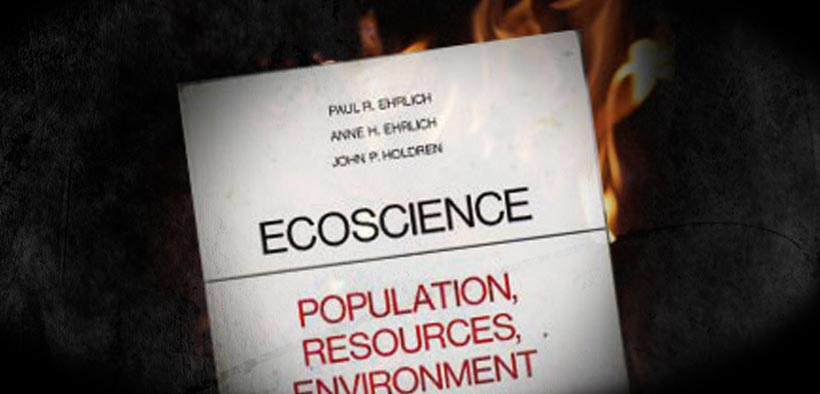White House Science Czar Denies Extreme Population Control Views

One of America’s leading population control advocates denies holding a nasty Eugenics creed.
Compulsory abortion. Under-the-skin birth control implants. Government authorized reproduction. A Planetary Regime to regulate the population and ration food and resources. A sterilant added to water supplies or food staples. The expansion of mandatory family planning and population restrictions. An earth teetering on the edge of destruction. All of this and more is discussed frankly in the 1977 textbook, Ecoscience: Population, Resources, Environment, written jointly by John P. Holdren, Paul Ehrlich and his wife Anne Ehrlich.
Tireless activist Luke Rudkowski, founder of WeAreChange.org, confronted John P. Holdren, the top science advisor in the White House, about some of those statements as they appear in that tract during a Q and A session.
From the podium, Holdren cuts off the question, saying, “I beg your pardon, I did not advocate any of that… I never held those beliefs. The book in question described in a chapter surveying all the things that had been suggested, those kinds of suggestions included. They were abhorrent and would never be embraced, should not be embraced. I’m kind of tired of that question. Folks should go back and look at that book.”
Holdren is partially justified in claiming that his book’s chapter is simply surveying other beliefs, but his claim of being separate from such thinking is ludicrous. Ecoscience contains a veritable anthology of the major population control efforts of the 20th Century, including radical plans for depopulation, often controversial contraceptive innovations, thorough efforts at instituting “family planning” programs in developing countries through United Nations and private philanthropic guidance and demands to curtail consumption and limit resources.
John P. Holdren, current White House “Science Czar” (technically the Director of the Office of Science and Technology Policy), has been a prominent figure in the larger Eugenics movement, dealing in population, environment and climate change matters, for most of his life.
Backed by major universities, endowments and foundations, his brand of science has been sponsored to promote radical approaches to curtailing human behavior, and with it, handing over more power to the self-appointed elite directing society.
Holdren is perhaps best known for his collaboration with Paul Ehrlich, the author of the 1968 Population Bomb, which portrayed an alarmist view of a population explosion exhausting earth’s resources and destroying life. The two have been frequent writing partners and were definitive, along with the Club of Rome (and their key publication Limits to Growth), in metering out a re-branded Eugenics based upon metrics about human consumption (a.k.a. “footprint”) and theories about earth’s “carrying capacity.”
In essence, these groups popularized a neo-Malthusian case for individual austerity and limits of some kind on the number of children families can have. For instance, the pair noted in a 1969 article on over-population, “If the population control measures are not initiated immediately, and effectively, all the technology man can bring to bear will not fend off the misery to come.”
While Holdren and Ehrlich may not have personally backed every initiative presented in their 1977 textbook, including such radical and draconian proposals demonstrates their larger position in supporting any/all population control measures that can establish acceptance. The larger Eugenics movement has always had more radical extremists, like Paul Popenoe, that make tamer proposals look reasonable. Yet, all tend towards the common goal of global control over reproduction and most find a common source of funding amongst the wealthy foundations of elite robber barons, monopolists and banking elite (which is directly acknowledged by Holdren & Ehrlich in the text).
Some proposals, like the one calling for sterilants in the water, are ostensibly rejected in the text, with this example finding no practical way to avoid tainting livestock supplies while targeting humans. However, a clear direction is marked out in the chapter, with sub-headers like “Towards a Planetary Regime” indicating the dominant trend towards more comprehensive authority over individual family choices.
Front Page Magazine took on Holdren’s legacy in 2009 in response to his White House appointment, labeling him “Obama’s Biggest Radical.” Ben Johnson makes the case that far from rejecting some of the more extreme measures discussed in the book, the authors “hide behind the passive voice.” Johnson writes about this in relation to discussing compulsory abortion:
“Holdren and the Ehrlichs maintained “there exists ample authority under which population growth could be regulated.” Hiding behind the passive voice, they note, “it has been concluded that compulsory population-control laws, even including laws requiring compulsory abortion, could be sustained under the existing constitution if the population crisis became sufficiently severe to endanger the society.” To underscore they mean business, they conclude, “If some individuals contribute to general social deterioration by overproducing children, and if the need is compelling, they can be required by law to exercise reproductive responsibility” (pp. 837-838).”
Webster Tarpley analyzes the positions of John P. Holdren and Paul Ehrlich in the Ecoscience text, in their extensive publications and in the context of the larger Eugenics movement:
Zombietime blog has emphasized some of the more shocking quotes that Ecoscience discusses, which the larger neo-Malthusian movement have discussing and, indeed, working towards establishing as real practices:
Page 837: Compulsory abortions would be legal
“Indeed, it has been concluded that compulsory population-control laws, even including laws requiring compulsory abortion, could be sustained under the existing Constitution if the population crisis became sufficiently severe to endanger the society.”
Page 786: Single mothers should have their babies taken away by the government; or they could be forced to have abortions
“One way to carry out this disapproval might be to insist that all illegitimate babies be put up for adoption—especially those born to minors, who generally are not capable of caring properly for a child alone. If a single mother really wished to keep her baby, she might be obliged to go through adoption proceedings and demonstrate her ability to support and care for it. Adoption proceedings probably should remain more difficult for single people than for married couples, in recognition of the relative difficulty of raising children alone. It would even be possible to require pregnant single women to marry or have abortions, perhaps as an alternative to placement for adoption, depending on the society.”
Page 787-8: Mass sterilization of humans though drugs in the water supply is OK as long as it doesn’t harm livestock
“Adding a sterilant to drinking water or staple foods is a suggestion that seems to horrify people more than most proposals for involuntary fertility control. Indeed, this would pose some very difficult political, legal, and social questions, to say nothing of the technical problems. No such sterilant exists today, nor does one appear to be under development. To be acceptable, such a substance would have to meet some rather stiff requirements: it must be uniformly effective, despite widely varying doses received by individuals, and despite varying degrees of fertility and sensitivity among individuals; it must be free of dangerous or unpleasant side effects; and it must have no effect on members of the opposite sex, children, old people, pets, or livestock.”
Page 786-7: Involuntary fertility control
“A program of sterilizing women after their second or third child, despite the relatively greater difficulty of the operation than vasectomy, might be easier to implement than trying to sterilize men.
…
The development of a long-term sterilizing capsule that could be implanted under the skin and removed when pregnancy is desired opens additional possibilities for coercive fertility control. The capsule could be implanted at puberty and might be removable, with official permission, for a limited number of births.”
Page 838: The kind of people who cause “social deterioration” can be compelled to not have children
“If some individuals contribute to general social deterioration by overproducing children, and if the need is compelling, they can be required by law to exercise reproductive responsibility—just as they can be required to exercise responsibility in their resource-consumption patterns—providing they are not denied equal protection.”
Page 838: Nothing is wrong or illegal about the government dictating family size
“In today’s world, however, the number of children in a family is a matter of profound public concern. The law regulates other highly personal matters. For example, no one may lawfully have more than one spouse at a time. Why should the law not be able to prevent a person from having more than two children?”
Page 942-3: Toward a Planetary Regime
“Perhaps those agencies, combined with UNEP and the United Nations population agencies, might eventually be developed into a Planetary Regime—sort of an international superagency for population, resources, and environment. Such a comprehensive Planetary Regime could control the development, administration, conservation, and distribution of all natural resources, renewable or nonrenewable, at least insofar as international implications exist. Thus the Regime could have the power to control pollution not only in the atmosphere and oceans, but also in such freshwater bodies as rivers and lakes that cross international boundaries or that discharge into the oceans. The Regime might also be a logical central agency for regulating all international trade, perhaps including assistance from DCs to LDCs, and including all food on the international market.
The Planetary Regime might be given responsibility for determining the optimum population for the world and for each region and for arbitrating various countries’ shares within their regional limits. Control of population size might remain the responsibility of each government, but the Regime would have some power to enforce the agreed limits.”
Page 917: We will need to surrender national sovereignty to an armed international police force
“If this could be accomplished, security might be provided by an armed international organization, a global analogue of a police force. Many people have recognized this as a goal, but the way to reach it remains obscure in a world where factionalism seems, if anything, to be increasing. The first step necessarily involves partial surrender of sovereignty to an international organization.”
Page 749: Pro-family and pro-birth attitudes are caused by ethnic chauvinism
“Another related issue that seems to encourage a pronatalist attitude in many people is the question of the differential reproduction of social or ethnic groups. Many people seem to be possessed by fear that their group may be outbred by other groups. White Americans and South Africans are worried there will be too many blacks, and vice versa. The Jews in Israel are disturbed by the high birth rates of Israeli Arabs, Protestants are worried about Catholics, and lbos about Hausas. Obviously, if everyone tries to outbreed everyone else, the result will be catastrophe for all. This is another case of the “tragedy of the commons,” wherein the “commons” is the planet Earth. Fortunately, it appears that, at least in the DCs, virtually all groups are exercising reproductive restraint.”
Page 944: As of 1977, we are facing a global overpopulation catastrophe that must be resolved at all costs by the year 2000
“Humanity cannot afford to muddle through the rest of the twentieth century; the risks are too great, and the stakes are too high. This may be the last opportunity to choose our own and our descendants’ destiny. Failing to choose or making the wrong choices may lead to catastrophe. But it must never be forgotten that the right choices could lead to a much better world.”












